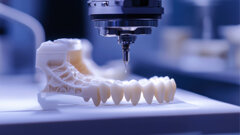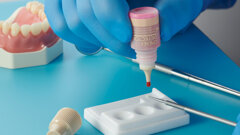BELÉM, Brazil: Television can often play a key role in determining what foods people purchase, thanks to its high concentration of food product advertisements. Unfortunately, the kinds of food products that are advertised are overwhelmingly high in sugar, fats and salt, and highly processed. It comes as little surprise, therefore, that a recent study has linked excessive television watching among children to higher levels of sugar intake and subsequent dental caries.
The observational, epidemiological and cross-sectional study was conducted by a team of researchers in Brazil and sought to evaluate the impact that television has on the dietary habits of 12-year-olds in the city of Belém. Of the 545 students who were chosen to participate, 510 were included in the final sample.
Each participating child was subject to a clinical oral examination to check for signs of caries as well as for missing or filled teeth. The study participants then filled out a questionnaire regarding their television watching, intake of cariogenic foods while watching television, and consumption of unhealthy foods and drinks after seeing them advertised on television.
The results showed that 53% of the children measured who watched television for more than 90 minutes per day had some form of caries—39% more than those who watched for less than 90 minutes per day. In addition, they were 33% more likely to eat high-sugar foods.
The majority (72%) of the participants’ parents said that they buy food products after their children have seen them advertised on television.
The influence of advertising on the excess consumption of high-sugar foods and drinks has been demonstrated by numerous studies, and some governments around the world have taken action to combat this trend. Dental Tribune International recently reported that the Singaporean government had taken steps to ban the advertising of high-sugar drinks across all domestic mass media platforms in an attempt to decrease the city-state’s diabetes rate.
The study, titled “The influence of television on the food habits of schoolchildren and its association with dental caries,” was published online on Sept. 5, 2019, in Clinical and Experimental Dental Research, ahead of inclusion in an issue.
Tags:
SYDNEY, Australia: For some women, hormonal changes that occur owing to pregnancy can lead to oral health problems such as dental caries and periodontal ...
SYDNEY, Australia: When it comes to the development of children’s habits, the influence their teachers hold in this regard is clear. In a new review study...
AMMAN, Jordan: As artificial intelligence continues to expand its role in healthcare, large language models such as ChatGPT are increasingly being used to ...
LONDON, UK: Though elite athletes generally possess an enviable level of physical fitness, a recent study has shown that their oral health may leave much to...
TAIPEI, Taiwan: The debate on climate change and its effects on the earth are a hot topic. One discussion, in particular, is around air pollution, which is ...
DURHAM, N.C., U.S.: In a recent study, researchers from Duke University in Durham have found that the walking speed of 45-year-olds can reveal a ...
HELSINKI, Finland: Scientists have previously identified obesity and increasing age as risk factors for gestational diabetes mellitus (GDM). Some scholars ...
WARSAW, Poland: There has long been a debate around what constitutes excessive time spent on devices and the adverse health effects of this. In a new study ...
MELBOURNE, Australia: In an effort to deter people from smoking, cigarette packets are labelled with warnings and graphic images. In a new study, ...
SYDNEY, Australia: The underlying causes of central sensitisation disorders such as migraine and fibromyalgia are poorly understood. The gut–brain axis ...
Live webinar
Wed. 25 February 2026
8:00 pm EST (New York)
Live webinar
Tue. 3 March 2026
11:00 am EST (New York)
Dr. Omar Lugo Cirujano Maxilofacial
Live webinar
Tue. 3 March 2026
8:00 pm EST (New York)
Dr. Vasiliki Maseli DDS, MS, EdM
Live webinar
Wed. 4 March 2026
12:00 pm EST (New York)
Munther Sulieman LDS RCS (Eng) BDS (Lond) MSc PhD
Live webinar
Wed. 4 March 2026
1:00 pm EST (New York)
Live webinar
Fri. 6 March 2026
3:00 am EST (New York)
Live webinar
Tue. 10 March 2026
4:00 am EST (New York)
Assoc. Prof. Aaron Davis, Prof. Sarah Baker



 Austria / Österreich
Austria / Österreich
 Bosnia and Herzegovina / Босна и Херцеговина
Bosnia and Herzegovina / Босна и Херцеговина
 Bulgaria / България
Bulgaria / България
 Croatia / Hrvatska
Croatia / Hrvatska
 Czech Republic & Slovakia / Česká republika & Slovensko
Czech Republic & Slovakia / Česká republika & Slovensko
 France / France
France / France
 Germany / Deutschland
Germany / Deutschland
 Greece / ΕΛΛΑΔΑ
Greece / ΕΛΛΑΔΑ
 Hungary / Hungary
Hungary / Hungary
 Italy / Italia
Italy / Italia
 Netherlands / Nederland
Netherlands / Nederland
 Nordic / Nordic
Nordic / Nordic
 Poland / Polska
Poland / Polska
 Portugal / Portugal
Portugal / Portugal
 Romania & Moldova / România & Moldova
Romania & Moldova / România & Moldova
 Slovenia / Slovenija
Slovenia / Slovenija
 Serbia & Montenegro / Србија и Црна Гора
Serbia & Montenegro / Србија и Црна Гора
 Spain / España
Spain / España
 Switzerland / Schweiz
Switzerland / Schweiz
 Turkey / Türkiye
Turkey / Türkiye
 UK & Ireland / UK & Ireland
UK & Ireland / UK & Ireland
 Brazil / Brasil
Brazil / Brasil
 Canada / Canada
Canada / Canada
 Latin America / Latinoamérica
Latin America / Latinoamérica
 USA / USA
USA / USA
 China / 中国
China / 中国
 India / भारत गणराज्य
India / भारत गणराज्य
 Pakistan / Pākistān
Pakistan / Pākistān
 Vietnam / Việt Nam
Vietnam / Việt Nam
 ASEAN / ASEAN
ASEAN / ASEAN
 Israel / מְדִינַת יִשְׂרָאֵל
Israel / מְדִינַת יִשְׂרָאֵל
 Algeria, Morocco & Tunisia / الجزائر والمغرب وتونس
Algeria, Morocco & Tunisia / الجزائر والمغرب وتونس
 Middle East / Middle East
Middle East / Middle East













































To post a reply please login or register